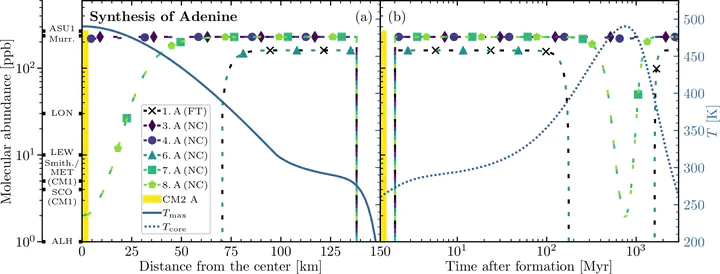Meteorites and the RNA World: Synthesis of Nucleobases in Carbonaceous Planetesimals and the Role of Initial Volatile Content
 Fig. 1 - Adenine abundances in carbonaceous chondrites - © CC BY 4.0
Fig. 1 - Adenine abundances in carbonaceous chondrites - © CC BY 4.0Abstract
Prebiotic molecules, fundamental building blocks for the origin of life, have been found in carbonaceous chondrites. The exogenous delivery of these organic molecules onto the Hadean Earth could have sparked the polymerization of the first RNA molecules in Darwinian ponds during wet-dry cycles. Here, we investigate the formation of the RNA and DNA nucleobases adenine, uracil, cytosine, guanine, and thymine inside parent body planetesimals of carbonaceous chondrites. An up-to-date thermochemical equilibrium model coupled with a 1D thermodynamic planetesimal model is used to calculate the nucleobase concentrations. Different from previous studies, we assume the initial volatile concentrations more appropriate for the formation zone of carbonaceous chondrite parent bodies. This represents more accurately cosmochemical findings that these bodies have formed inside the inner, $\sim 2\mathrm{-}5 \mathrm{au}$, warm region of the solar system. Due to these improvements, our model represents the concentrations of adenine and guanine measured in carbonaceous chondrites. Our model did not reproduce per se the measurements of uracil, cytosine, and thymine in these meteorites. This can be explained by transformation reactions between nucleobases and the potential decomposition of thymine. The synthesis of prebiotic organic matter in carbonaceous asteroids could be well explained by a combination of (i) radiogenic heating, (ii) aqueous chemistry involving a few key processes at a specific range of radii inside planetesimals where water can exist in the liquid phase, and (iii) a reduced initial volatile content (H₂, CO, HCN, and CH₂O) of the protoplanetary disk material in the parent body region compared to the outer region of comets.
Read more in my corresponding Twitter thread:
Do you know what the death of all dinosaurs 🦕 and the origins of life 🧬 might have in common? Carbonaceous chondrites, carbon-rich meteorites, 🌠 might have caused both. Skeptical? Hear me out 👇🧵 and read our w/@AstroBio_Ben freshly published paper https://t.co/x5XvmxmySR
— Klaus Paschek (@AstroBioKlaus) January 23, 2023
1/8 pic.twitter.com/QMi7WwApii